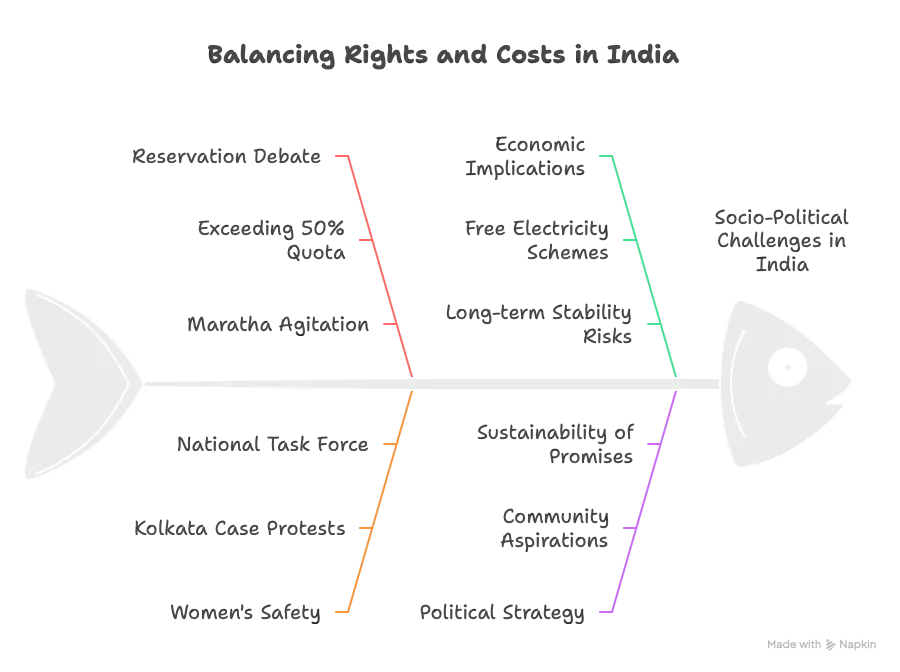UPSC
The Hindu Briefs
Balancing Rights and Costs: India’s Socio-Political Challenges
Last Updated
12th April, 2025
Date Published
12th April, 2025
Share This Post With Someone

- Reservation Debate: The newsletter highlights discussions on reservations, particularly for Marathas in Maharashtra, questioning if exceeding the 50% quota cap is justified.
- Constitutional Limits: A 1992 Supreme Court ruling capped reservations at 50%, but recent demands challenge this, raising concerns about fairness and legal boundaries.
- Maratha Agitation: Maratha quota activist Manoj Jarange-Patil pushes for Kunbi caste inclusion in the OBC category, complicating Maharashtra’s reservation matrix.
- Political Implications: Reservation demands influence electoral politics, with parties balancing community aspirations against constitutional constraints.
- Women’s Safety Concerns: The newsletter addresses protests over women’s safety, sparked by a rape and murder case at R.G. Kar Medical College, Kolkata, in August 2024.
- Justice Demands: West Bengal doctors’ protests led to Supreme Court intervention, forming a National Task Force to enhance safety measures for medical professionals.
- Governance Critique: The handling of the Kolkata case raised questions about West Bengal’s governance under Mamata Banerjee, with public trust eroding.
- Economic Angle: The newsletter explores the cost of rights, noting that free electricity schemes burden state finances, impacting development funds.
- Populist Policies: Promises like free electricity in Punjab and Delhi strain budgets, with Punjab’s scheme costing ₹1.25 lakh crore over five years.
- Fiscal Concerns: Experts warn that populist measures, while politically appealing, risk long-term economic stability, diverting funds from infrastructure or education.
- Right to Education: The newsletter reflects on the Right to Education Act, highlighting its goal of universal education but noting gaps in implementation.
- Data Insights: Only 13% of students in private unaided schools avail of RTE’s 25% reservation, showing limited reach for marginalized groups.
- Social Equity: Reservation and safety debates underscore broader issues of social justice, with caste, gender, and economic divides at the forefront.
- Political Strategy: Parties use rights-based promises to gain votes, but the newsletter questions their sustainability and impact on governance.
- Public Discourse: The newsletter emphasizes the need for informed debate on balancing rights with fiscal responsibility to ensure equitable progress.

Key Terms:
- Reservation: Policy reserving seats for marginalized groups in education and jobs.
- 50% Cap: Supreme Court limit on total reservation quotas in India.
- Maratha Quota: Demand for affirmative action for the Maratha community in Maharashtra.
- Women’s Safety: Measures to protect women from violence and harassment.
- Populist Policies: Government schemes aimed at voter appeal, often financially unsustainable.
- Right to Education: Act ensuring free education for children aged 6-14.
- Fiscal Burden: Economic strain from high-cost welfare schemes.
- Social Justice: Efforts to address caste, gender, and economic inequalities.
Link To The Original Article – https://www.thehindu.com/opinion/political-line-newsletter-rights-and-the-right-price/article69438117.ece